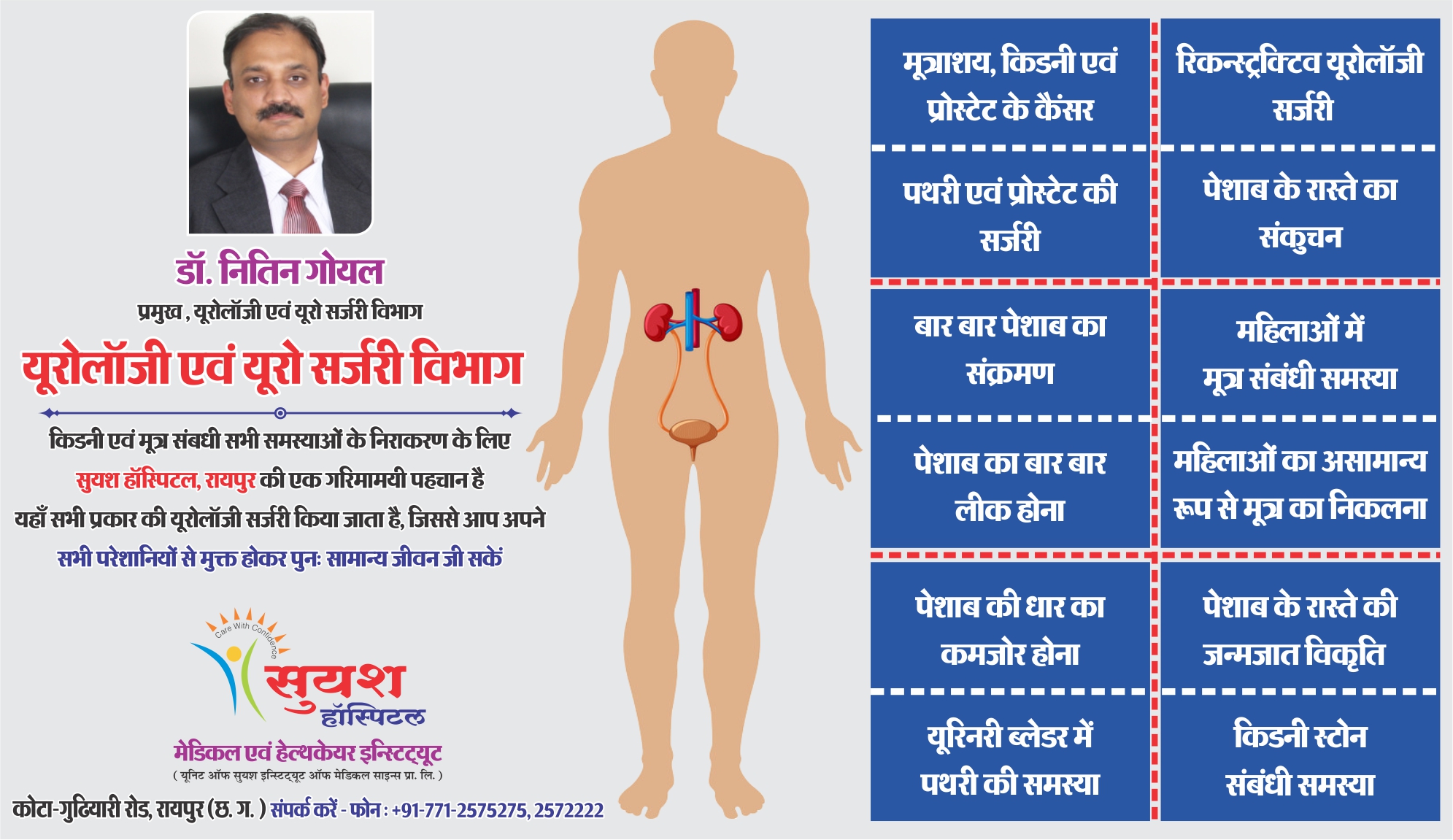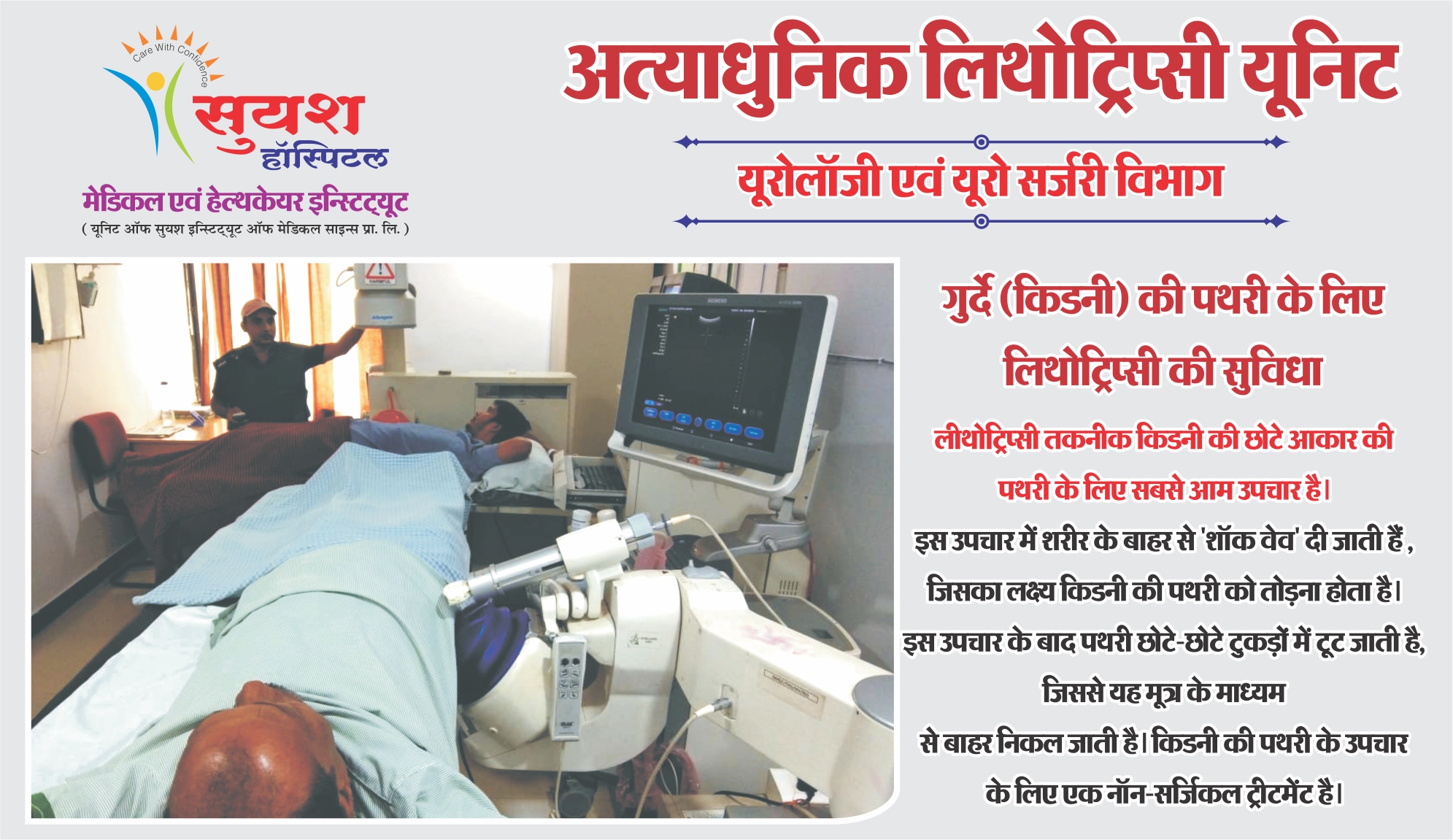Urology is a surgical specialty which deals with diseases of the male and female urinary tract and the male reproductive organs. The complexity of knowledge and rapid development of technologies used to assess and treat the conditions affecting the genito-urinary tract have prompted the development of subspecialties within urology.
Endourology involves the use of small fibre optic scopes which can be passed through the urethra to visualize internally the lining of the urinary tract from kidney to bladder. Thin, flexible instruments including lasers, graspers, miniature stone retrieval baskets, special scalpels, and cautery, can be advanced through working channels in the scopes in order to perform surgery without creating any incisions at all. The majority of endoscopic procedures can be done on an outpatient basis.
At Suyash Superspeciality Hopsital, surgeons use state-of-the-art surgery procedures that use optic devices to view body cavities, providing a variety of diagnostic and corrective procedures that are less invasive than conventional procedures. The procedures, known as Endosurgery, also offer the benefit of reduced trauma to the patient. Suyash Hospital offers the treatments for:
» Kidney Stones
» Prostate Cancer
» Benign Prostatic Hyperplasia
» Bladder Cancer
Kidney Stones Treatment
The urinary tract, or system, consists of the kidneys, ureters, bladder, and urethra. The kidneys are two bean-shaped organs located below the ribs toward the middle of the back. They remove extra water and wastes from the blood, converting it to urine. They also keep a stable balance of salts and other substances in the blood. The kidneys produce hormones that help build strong bones and help form red blood cells. Narrow tubes called ureter carry urine from the kidneys to the bladder, an oval-shaped chamber in the lower abdomen. Like a balloon, the bladder's elastic walls stretch and expand to store urine. They flatten together when urine is emptied through the urethra to outside the body. One in every 20 people develops a kidney stone at some point in their life. A kidney stone is a hard mineral and crystalline material formed within the kidney or urinary tract.

Urology is a discipline that involves the study of many organs and physiological systems. Urology can be broken down into the following subfields:
Endo-Urology
Endourology is the branch of urology that deals with minimally invasive surgical procedures. As opposed to open surgery, endourology is performed using small cameras and instruments inserted into the urinary tract.
Urologic-Oncology
Urologic oncology concerns the surgical treatment of malignant genitourinary diseases such as cancer of the prostate, adrenal glands, bladder, kidneys, ureters, testicles and penis. The medical treatment of advanced genitourinary cancer is managed by either a Urologist or an Oncologist depending on the cancer.
Neuro-Urology
Neurourology concerns the control of the genitourinary system by the nervous system and of conditions causing abnormal urination. Neurological diseases and disorders such as multiple sclerosis, Parkinson’s disease and spinal cord injury can disrupt the lower urinary tract and result in conditions such as urinary incontinence, detrusor overactivity, urinary retention and detrusor sphincter dyssynergia.
Pediatric-Urology
Pediatric urology concerns urologic disorders in children. Such disorders include cryptorchism (undescended testes), congenital abnormalities of the genito-urinary tract, enuresis, underdeveloped genitalia (due to delayed growth or delayed puberty, often an endocrinological problem) and vesicoureteral reflux.
Andrology
Andrology is mainly concerned with male infertility, erectile dysfunction and ejaculatory disorders. Since male sexuality is largely controlled by hormones, andrology overlaps with endocrinology. Surgery in this field includes fertilization procedures, vasectomy reversals and the implantation of penile prostheses. Vasectomies may also be included here although most urologists perform this procedure.
Reconstructive Urology
Reconstructive urology reestablishes functionality of the genito-urinary tract. Strictures of the urethra or the ureter often require reconstructive surgery. Another frequent procedure is the reconstruction of the urinary bladder from small bowel in conjunction with cancer surgery. Cosmetic surgery such as penis enlargement is rarely done in urology.
Female Urology
Female urology is a branch that deals with overactive bladder, pelvic organ prolapse, and urinary incontinence. Thorough knowledge of the female pelvic floor together with urodynamic skills are necessary to diagnose and treat these disorders. Depending on the cause of the individual problem a medical or surgical treatment can be the solution.
Suyash Hospital Department of Urology & Urosurgery is composed of multiple subspecialty trained urologists, who have additional training in specialized surgical techniques. Our skilled team of experts work collaboratively with other specialty areas, including internal medicine, pediatrics, gynecology, geriatrics and oncology to provide highly complex care individualized to the needs of the patient.
We offer evaluation, consultation and treatment for a wide range of adult urologic issues, including urinary infections, female pelvic health issues, incontinence, kidney stones, infertility and cancer and provide solutions in the areas of:
Common Procedures:
» Trans-Urethral Needle Ablasion of the Prostat
» Cystoscopy with Retrograde Pyelogram
» Prostatectomy
» Trans-Urethral Resection of Prostate
» Circumcision
» Ureterorenoscopy for ureteric stones
» PCNL(Percutaneous Nephrolithotomy)
» Cystolitholapexy for bladder stones
» ESWL for renal stones.
» Urethroplasty for stricture
» VVF/UVF repair
» Nephrectomies
» Pyeloplasty
» Hypospadias repair
» Advanced stone treatment
» Erectile dysfunction
» Genitourinary disorder
» Urinary tract infection (UTI)
» Prostate diseases
» Congenital Abnormalities
» Urological oncology
Advanced Lithotripsy Unit at suyash Hospital:
Lithotripsy is a procedure that uses shock waves to break up stones in the kidney and parts of the ureter (tube that carries urine from your kidneys to your bladder). After the procedure, the tiny pieces of stones pass out of your body in your urine. Lithotripsy takes about 45 minutes to an hour to perform. You'll likely be given some form of anesthesia (local, regional, or general) so you don't experience any pain. After the procedure, stone debris is removed from your kidneys or ureter, the

tube leading from your kidney to your bladder, through urination. ESWL may be used on a person who has a kidney stone that is causing pain or blocking the urine flow. Stones that are between 4 mm (0.16 in.) and 2 cm (0.8 in.) in diameter are most likely to be treated with ESWL.The recovery time is usually fairly brief. After treatment, the patient can get up to walk almost at once, Many people can fully resume daily activities within one to two days. Special diets are not required, but drinking plenty of water helps the stone fragments pass. For several weeks, you may pass stone fragments.
